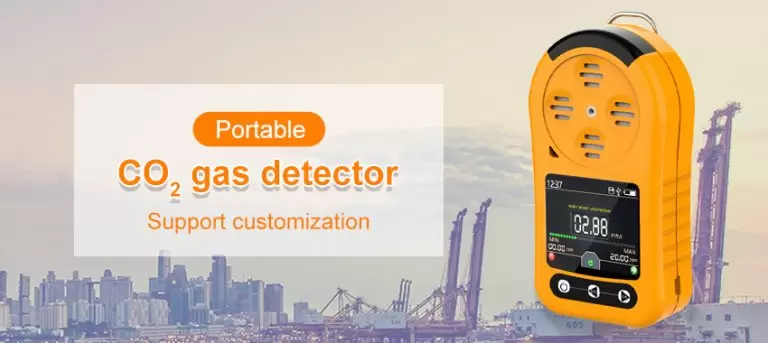Gas leak detector is a device detect the presence of gas leaks in various environments. Gas leaks can be highly dangerous, as they can lead to fires, explosions, or health hazards if left undetected.
The importance of gas leak detector

The importance of gas leak detectors lies in their ability to provide early warning of potentially dangerous gas leaks. By promptly detecting gas leaks, they help prevent accidents, protect property, and ensure the safety of occupants. Regular maintenance and testing of gas leak detectors are necessary to ensure their ongoing accuracy and reliability.
A gas leak detector is an essential safety tool for detecting and alerting individuals to gas leaks. They play a vital role in preventing accidents and protecting lives and property by enabling timely intervention to address gas leak issues.
Working principle of gas leak detectors
This gas leak detector is typically with a sensitive sensor that can quickly detect the presence of Freon gas. When the sensor detects the gas, it will typically provide an audible and visual alert to the user, indicating the presence of a leak.

A gas leak detector is a device detect the presence of gas leaks in various environments. It is an important tool for monitoring residential and commercial environments for safety purposes. Gas leaks can be highly dangerous, as they can lead to fires, explosions, or health hazards if left undetected.
Gas leak detectors work by sensing and monitoring the concentration of specific gases in the air. They use sensors that are capable of detecting various types of gases, such as natural gas, propane, carbon monoxide, and methane. These detectors are usually portable and handheld, allowing for easy use and mobility in different areas.
Types of gas leak detectors
There are different types of gas leak detectors available, each utilizing various technologies for accurate detection. Some common types include:
Freon leak detector
The portable Freon leak detector is a small, lightweight, and easy to use device. Specializes in detecting the presence of freon gas leaks in various refrigeration and air conditioning systems. It’s a battery-powered device that we use to quickly and accurately identify freon gas leaks; Thus, save time and money for maintenance work.

Such detectors usually carry a sensitive sensor that can quickly detect the presence of freon gas. When the sensor detects the gas, it will typically provide an audible and visual alert to the user, indicating the presence of a leak. Freon gas leak detectors are commonly monitor high and low pressure systems. Also can use it to do all kinds of refrigerants, including 22, R – R – 410 – a, R – 404 – a and so on.
The main advantages of using a portable Freon leak detector is that it allows the technician to quickly and accurately identify the source of the leak, which can save time during repair work.
Oxygen leak detector
The oxygen leak detector gas is also a portable and convenient small gas detector. It adopts the latest digital integrated circuit technology and international gas detection technology. It is a brand-new intelligent gas detector.

The oxygen leak detector offers early detection, safety assurance, easy installation, versatility, continuous monitoring, cost-efficiency, and a user-friendly interface. These advantages make it an essential device for effectively managing and mitigating risks associated with oxygen leaks, ensuring safety in various environments.
Combustible gas detector
Combustible gas leak detector is a gas detector that detects combustible gas through natural diffusion. The portable LEL gas detector has the features of sensitive probe, sound and light alarm, automatic temperature repair, backlight display and so on.

Combustible gas detector housing with high-strength engineering plastic and non-slip design, easy to use and maintain. The high precision combustible gas sensor is adopted to meet the requirements of equipment accuracy in field safety detection. People use this detector in gas stations, chemical plants, kitchen gas, natural gas, metallurgical workshops and other occasions.
How to choose a gas leak detector?
Choosing a gas leak detector is crucial to ensure the safety of your environment and mitigate potential risks associated with gas leaks. Here are some important factors to consider when selecting a gas leak detector:
1.Gas Type:
Identify the specific types of gases or vapors you need to detect. Different detectors are designed to detect specific gases, such as methane, propane, carbon monoxide, hydrogen, or volatile organic compounds (VOCs). Ensure that the detector you choose is capable of detecting the target gas.

2.Sensitivity:
Consider the sensitivity levels required for your application. Some environments may require highly sensitive detectors to detect even small gas leaks, while others may not require such high sensitivity. Evaluate the sensitivity range of the detector and choose accordingly.
3.Detection Method:
Gas detectors employ various detection methods, including catalytic sensors, infrared sensors, electrochemical sensors, or semiconductor sensors. Each method has its advantages and limitations. Determine the most suitable detection method based on your specific needs and the characteristics of the environment.
4.Response Time:

The response time of a gas leak detector is crucial in ensuring immediate detection and response to potential leaks. Look for detectors with fast response times to enable timely action to prevent accidents or hazardous situations.
5.Alarm System:
Check the alarm system of the gas leak detector. It should have audible, visual, or vibrating alarms to alert users in case of a gas leak. Ensure that the alarm system is reliable and easily noticeable to ensure prompt evacuation or appropriate action.

6.Portability and Ease of Use:
Consider whether you need a portable or fixed gas leak detector. Portable detectors are ideal for mobile applications, while fixed detectors are suitable for permanent installations. Additionally, ensure that the detector is user-friendly, with easy-to-read displays and intuitive controls.
7.Accreditation and Standards:
Verify if the gas leak detector complies with industry standards and safety regulations. Look for certifications or accreditations from recognized organizations that demonstrate the detector’s reliability and quality.
8.Maintenance and Calibration:
Consider the maintenance requirements and calibration frequency of the detector. Regular maintenance and calibration are essential to ensure the accuracy and effectiveness of the detector. Look for detectors that offer easy maintenance and calibration procedures.
By carefully considering these factors and assessing your specific requirements, you can choose a gas leak detector that best suits your needs and provides reliable and accurate detection of gas leaks, ensuring the safety of your environment and occupants.






